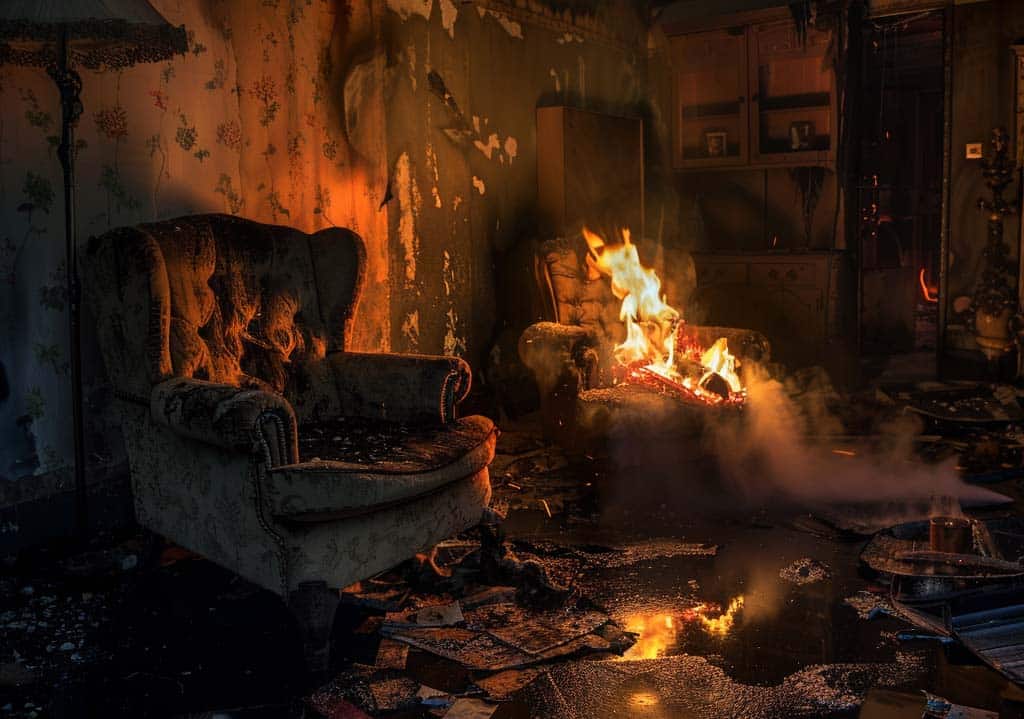
13 Dec Basement Fires
Fire Safety Risks
Basements and garages present additional fire safety risks compared to other home areas. Flammable liquids stored in combustibles, gas appliances, and electrical tools can lead to fires.
Considering kitchens are the number one location where fires start, if you have a finished basement with a kitchen and a fireplace, then the risk increases tremendously. According to the National Fire Protection Association (NFPA), approximately 7% of residential fires originate in basements or crawl spaces.
Basement fires often start due to electrical malfunctions, improper storage of flammable materials, or faulty heating systems. Additionally, if a basement is used as a workshop or for other activities involving power tools and machinery, the risk of fire increases. Therefore, it is crucial to ensure proper fire safety measures, such as installing smoke alarms, maintaining electrical systems, and adequately waterproofing and storing hazardous materials correctly to prevent basement fires.
Moreover, as a property owner of a commercial building, preventing fires in the workplace, in the basement, or on the top floor is not only a matter of compliance with OSHA regulations but also a crucial aspect of risk management. Always consult with OSHA (Occupational Safety and Health Act of 1970) on best fire prevention practices.
Regular inspections of electrical systems, adequate maintenance of fire-fighting equipment, and proper storage of flammable materials are just a few examples of the proactive measures that can be taken to mitigate fire risks. Being proactive in fire prevention not only ensures the safety and well-being of employees but also safeguards the long-term success and profitability of the business.
Fires can result in devastating property damage, potential injuries or fatalities, and significant financial losses for the business. By implementing effective fire prevention measures, property owners can protect their investments, maintain business continuity, and preserve their reputation in the industry.
According to the United States Fire Administration, paying close attention to the following actions can save lives:
- Keep anything that can burn at least three feet from the furnace, oil burner, wood stoves, water heaters, and other heat-generating equipment
- Keep oily rags in airtight containers and away from heat sources
- Trash should not be stored in the basement
- Washers and dryers should be plugged directly into wall outlets
- Check for damaged or overloaded electrical outlets, cords, and cables
- Keep anything that can burn away from electrical equipment
In the rest of the building:
- Never leave portable heating devices unattended
- Make sure smoke alarms and fire sprinklers are correctly installed and working
- Post clear fire escape plans on every level of a building
- Teach employees about exit locations, escape routes, and fire protection equipment
These messages help increase awareness about dangerous basement and garage fires in your community, whether in a home where families live or in a commercial building where families earn their livelihood.
Does a fire cause water damage to your house?
Burst pipes from your home’s plumbing can also cause extensive water damage. The fire’s intense heat can melt plastic pipes quickly or cause structural weakness in metal pipes that can cause leaks or failures. Fire-fighting crews often need to turn off your home’s water supply after they’ve tackled the flames.
Should the unfortunate event of a fire occur, yet the local fire department puts it out effectively, you will now face a lot of water damage to whatever didn’t get burned. That becomes quite a mess. You’ll need recovery, possibly foundation or plumbing repairs.
According to the Insurance Information Institute (III), water damage is one of the most common consequences of fire incidents. This can result in not only structural damage but also the potential for the growth of mold and mildew. Therefore, after a fire in the basement, it is crucial to take immediate action to address water damage and initiate the necessary repairs and restoration processes.
At SAS, we offer the following:
PLUMBING SERVICES:
- Sump pumps & Back up sump pumps
- Hot water tanks
- Garbage disposal & faucets
- Water and sewer line repairs
- Leaky toilets and pipes
- Certified backflow specialists
SEWER SERVICES:
- Clogged Drains
- Sewer Lines
- Kitchen Sinks
- Floor Drains
- Toilets
- Tub/Showers
Contact the plumbing and sewer experts at SAS Services, Inc. for a dry, healthy home.
What should be replaced after a fire?
Items that should be replaced include most electronics, such as televisions, radios, humidifiers, lamps, Sump Pumps & Back-Up Sump Pumps, etc. You should create a home inventory ahead of time and submit it to your insurance company so that you know what they will and will not cover when it comes to replacements and restorations.
Sump pumps are crucial in preventing water damage and flooding in basements and crawl spaces. They are designed to collect and pump out excess water that may accumulate due to heavy rain, melting snow, or other factors. Back-up sump pumps provide an additional layer of protection in the event of a power outage or pump failure. These systems ensure that your home remains dry and safe, protecting your valuable belongings and maintaining the structural integrity of your property.
Another essential mechanical system that is typically in the basement is a water heater. Modern households rely on various appliances and fixtures to provide comfort and convenience. Hot water tanks, for example, ensure that we have a continuous hot water supply for bathing, cooking, and cleaning. Our skilled plumbers are responsible for installing, repairing, and maintaining these critical components, ensuring that our homes function smoothly.
Plumbing services also include addressing problems that may arise with water and sewer lines, such as leaks, blockages, or damage. Timely repairs are necessary to prevent extensive damage and costly repairs in the long run. Leaky toilets and pipes not only waste water but can also lead to mold growth and structural damage. Backflow specialists play an essential role in ensuring that our water supply remains safe and uncontaminated by preventing cross-connections between potable and non-potable water systems. Our professionals are certified to install, test, and maintain backflow prevention devices, protecting our health and well-being.
Basement Fires
In conclusion, basement fires pose significant risks to both residential and commercial properties. The combination of flammable materials, electrical malfunctions, and faulty heating systems can quickly lead to devastating fires. Property owners can safeguard their investments by understanding the risks of basement fires, taking preventive measures, and promptly addressing any fire or water damage.


No Comments